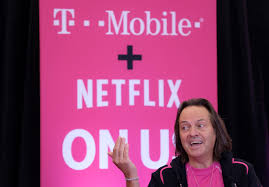
Network Neutrality and the problem of zero-rating
Anyone note the explosion of advertising for free access to content like Spotify or Netflix? This T-Mobile ad samples TV so much it could be mistaken for a Netflix promotion. But if we look past the smiling shots of our favorite TV characters high-fiving, we see the first signs of what life on the web will be like after Network Neutrality.
It is no coincidence we see these offers in the wake of weakened Network Neutrality principles. This practice, “zero-rating,” is a clear example of what NN advocates have feared. Zero rating is the practice of creating partnerships with content providers like Netflix and making access to content from certain providers cheaper. Those who control the network get to play favorites in choosing the content flowing through their “pipes.” In short, not everyone trying to reach users/customers is treated equally.
How is this anti-competitive? Imagine we want to launch a music service to compete with Spotify. We have a good tech team that worked hard developing a friendlier user interface and faster file access for the consumer. Spotify’s deal with T-Mobile means our start-up music service, regardless of our app’s superiority, will likely fail. Why? Incumbent market advantages:
- Access to customers. Spotify will have a guaranteed user base in T-Moblie’s subscribers. Big user bases attract revenue from venture capital and new media investors of the Silicon Valley sort.
- Advertiser appeal. A high number of users (high traffic) will mean increased interest from advertisers, another revenue stream.
- Data sales. High traffic also provides user data. User data is valuable to marketing firms and several new industries that lurk in the shadowy world of data brokers (one broker offering a “Rape Sufferers List” for targeted marketing).
All of these factors add up to tall barriers to entry for competitors. By preferring Spotify’s content over others, network owners will effectively pick and choose winners while stifling innovative startups. And what is the likelihood that T-Mobile will allow a Spotify competitor to use the T-Mobile network?
This glimpse of a post-Network Neutral internet shows how anti-competitive the legal environment can become. It is a sharp contrast with the early (network-neutral) internet that allowed a young Netflix to challenge cable providers. Even seemingly innocuous Netflix package deals could be harbingers of a significantly less competitive industry in which consumers and startups ultimately lose.

Despite the upbeat Netflix vignettes, these growing and merging media companies are not friendly giants. Zero-rating is a first stage of dramatic changes in store for a post-NN world. Network Favoritism of this sort dampens the industry’s ability to produce innovations and removes incentives to improve customer services. Without Network Neutrality, we risk more concentration in ownership and the development of distribution-content trusts. These trusts are more likely to stifle innovation.
Internet service providers like Comcast argue they would suffer unfair market disadvantages, but Comcast’s position on NN is contorted. As T.C. Sottok noted in The Verge, Comcast’s incoherent NN policy goes something like: “We respect and abide by NN principles and that is why we want them removed.” It begs the simple question: If the company appreciates NN, why petition to change FCC rules?
Public relations speak has made Comcast’s position nonsense, but policymakers have maps for navigating these waters. Nineteenth century Americans fought the Standard Oil monopoly because trusts and monopoly violated American ideas of capitalism. Concentration led to market dysfunction and harmed the economy at large. Early in the 20th century, AT&T had bought up most of the nation’s phone networks but accepted substantial government regulation in exchange for becoming the nation’s sole telephone company. AT&T owned all the market and Americans had public interest (9-1-1, fair rates, equal access) hardwired into US telecommunications system.
Standard Oil’s J D Rockefeller was a strict, church-going man. Reporters of the era noted that he taught Bible school on Sundays, but, by Monday, he was as ruthless a business mogul as the Gilded Age could produce. Disney may have the veneer of progressive ice princesses and dancing tea sets, but the media business is, well, business.
